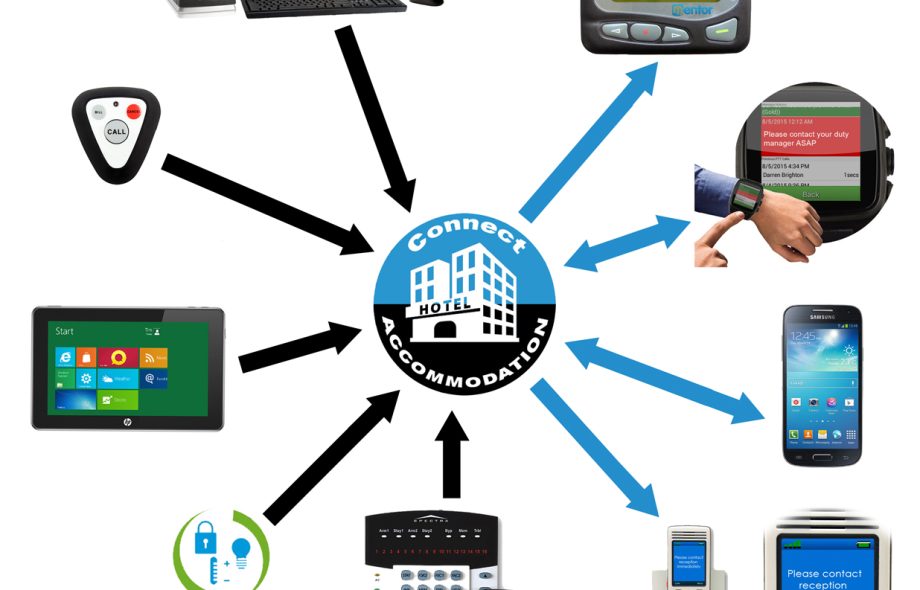Introduction
In the hospitality industry, effective communication is key to delivering exceptional guest experiences and ensuring smooth hotel operations. A Hotel Communication System is a vital tool that connects guests with staff, departments, and external services seamlessly. Whether it’s handling guest requests, coordinating housekeeping, or managing emergencies, a well-designed communication system improves efficiency, guest satisfaction, and overall service quality.
This article explores the importance of hotel communication systems, their key components, benefits, and how modern technology is transforming the way hotels interact with guests and staff.
What is a Hotel Communication System?
A Hotel Communication System refers to the integrated network of devices, software, and protocols used to facilitate communication between guests, staff, and management within a hotel. It includes traditional methods like telephones and intercoms, as well as advanced digital solutions such as mobile apps, messaging platforms, and AI-powered chatbots.
The primary goal of these systems is to ensure:
Quick response times to guest requests
Efficient internal coordination among staff
Enhanced security and emergency communication
Personalized guest interactions
Key Components of a Hotel Communication System
1. Guest-Staff Communication Tools
In-Room Telephones: Allow guests to call reception, room service, or other departments.
Mobile Apps & Messaging: Hotels use apps (like WhatsApp, or custom hotel apps) for real-time messaging.
Digital Concierge Services: AI chatbots or virtual assistants handle FAQs and service requests.
2. Internal Staff Communication
Two-Way Radios & Walkie-Talkies: Used by housekeeping, security, and maintenance teams.
Property Management System (PMS) Integration: Ensures all departments receive real-time updates on guest requests.
Task Management Software: Assigns and tracks housekeeping, maintenance, and service tasks.
3. Emergency Communication Systems
Fire Alarms & PA Systems: Broadcast emergency alerts across the hotel.
Mass Notification Systems: Send SMS or app alerts during crises.
Panic Buttons for Staff: Enhances employee safety in case of threats.
4. Digital Signage & Information Displays
Interactive Kiosks: Help guests check-in, find amenities, or book services.
TV & In-Room Tablets: Display hotel services, promotions, and local guides.
5. Multilingual Support
Translation Features: Help staff communicate with international guests.
Voice Assistants with Language Options: Improve accessibility for non-native speakers.
Benefits of an Effective Hotel Communication System
1. Improved Guest Satisfaction
Faster response times to requests (e.g., room service, housekeeping).
Personalized interactions through digital concierge services.
Seamless check-in/check-out via mobile apps.
2. Enhanced Operational Efficiency
Automated task assignments reduce delays.
Real-time updates prevent miscommunication between departments.
Reduced workload on front desk staff with self-service options.
3. Increased Safety & Security
Instant alerts during emergencies (fire, medical issues, security threats).
Secure communication channels for sensitive guest data.
4. Cost Savings & Revenue Growth
Fewer staffing bottlenecks with automated systems.
Upselling opportunities through digital promotions.
Reduced need for printed materials (menus, directories).
5. Competitive Advantage
Tech-savvy guests prefer hotels with modern communication tools.
Positive reviews from seamless guest experiences boost reputation.
Modern Trends in Hotel Communication Systems
1. AI & Chatbots
AI-powered virtual assistants handle bookings, FAQs, and service requests 24/7.
Reduces staff workload while improving response times.
2. Mobile Key & Contactless Communication
Guests use smartphones for check-in, room access, and service requests.
Minimizes physical contact (post-pandemic preference).
3. IoT (Internet of Things) Integration
Smart rooms with voice-controlled lights, temperature, and TV.
Sensors alert staff when amenities need replenishing.
4. Unified Communication Platforms
Combines phone, chat, email, and PMS into one system for seamless operations.
5. Cloud-Based Systems
Remote access for management and staff.
Scalable for hotels of all sizes.
How to Choose the Right Hotel Communication System?
When selecting a communication system, consider:
Hotel Size & Needs – Boutique hotels may need simpler systems than large resorts.
Budget – Balance cost with long-term benefits.
Integration with Existing Tools – Ensure compatibility with PMS and other software.
User-Friendliness – Staff and guests should find it easy to use.
Security & Compliance – Data protection and emergency features are crucial.
Conclusion
A Hotel Communication System is no longer just about phones and intercoms—it’s a smart, integrated network that enhances guest experiences and operational workflows. By adopting modern solutions like AI chatbots, mobile apps, and IoT devices, hotels can stay competitive, improve efficiency, and deliver exceptional service.
Investing in the right communication system ensures smoother operations, happier guests, and a stronger brand reputation in the hospitality industry.



 :
:









